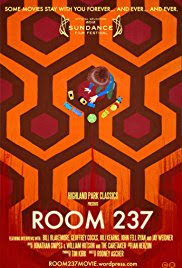 The Shining
The Shining, written and directed by Stanley Kubrick, starring Jack Nicholson, Shelley Duvall, Danny Lloyd and Scatman Crothers (1980): While watching
The Shining over the course of three nights on my PVR, I realized that, for me at least, I'd found the perfect way to watch it.
The Shining has always been a movie of dazzling parts held together by a plot that shudders and jolts to a complete stop at points. It may be that Kubrick wanted to make a much longer movie, or it may be that Kubrick never intended the plot to work all that well in the first place. This was not a film-maker that gave a crap about pleasing an audience in a traditional way, after all.
The basic plot is this: failed writer Jack Torrance, wife Wendy and five-year-old son Danny take the job as winter caretakers at a Colorado hotel located in the Rockies. The hotel closes from November 1 to April 30 for the winter, leaving the caretakers the only people for miles. Danny has a psychic talent called "The Shining" which gives him premonitions of the future, causes him to see things, and occasionally results in his body being taken over by the benevolent but creepy "Tony."*
Overlook head cook Halloran also has "The Shining." He cautions Danny about the hotel's ability to show people illusions, and tells Danny to signal him telepathically should anything go wrong over the course of the winter. The Overlook Hotel itself has been the site of a number of murders and atrocities over the years, not least of which was a previous caretaker murdering his wife and twin daughters before killing himself. Over the course of the first five weeks or so of caretaking, hilarity gradually ensues.
Certainly, enjoyment of the film requires one to forget about Stephen King's novel. In the novel, Jack Torrance (played by Jack Nicholson in the movie) is a good man undone by alcoholism and circumstances and, of course, by the hotel. In the movie, Torrance is a physically abusive nutcase barely hiding his unravelling psyche from his wife Wendy (Duvall) and son Danny (Lloyd) even as the movie begins. There's very little sense that Torrance actually loves his family, and his fairly rapid descent into a homicidal fury suggests a sub-text of family violence and monstrous fathers that doesn't exist in the novel. Wendy, a blonde beauty in the novel, becomes the awkward Duvall in the movie, and Torrance-POV shots at key moments in the movie are probably the least flattering shots of Shelley Duvall ever put on screen. Of course, that's the point: Torrance's real view of his wife, allowed to fester by the hotel, is that she's a hideous shrew.
Production design and camera work are key here, as they are in all of Kubrick's films once he had complete creative control. The interior of the snow-bound Overlook Hotel is subtly alien and off-putting both due to size and colour scheme; the rugs alone might drive almost anyone off the deep end. Certain things work really well as horror -- the looming hedge maze is an improvement over the novel's homicidal hedge animals -- while others seem to verge on parody. The red-and-white washroom is really pretty hilarious.
That line between hilarity and horror -- or horror and horror-parody -- is crossed and recrossed throughout the film. One of Kubrick's stated aims -- to make a horror movie in which the lights stay on as much as possible -- is pretty much achieved. Certain scenes and images (especially the blood-torrent-spewing elevator) play more like parody, and the revelation that 'Redrum' is 'murder' spelled backwards lands with a dull thump, as does the 'shocking' photographic revelation that ends the movie. I believe these thuds are intentional: Kubrick seems to be aiming to scare people and make fun of horror tropes at the same time, maybe never moreso than in the fate of Halloran in the movie, much altered from the novel.
Nonetheless, there are enough startling moments -- the revelation of what Jack's been typing for weeks, Jack's pursuit of Danny through the hedge maze -- to allow the horror to outweigh Kubrick's parodic play with the horror. Kubrick's film also serves as a companion piece to his own
2001: A Space Odyssey: rather than watching humanity evolve from killer ape to Star Child, we watch Torrance devolve back into a killer ape chasing his own son through the hedge maze, his urge to do violence ultimately destroying him while Wendy and Danny are saved by Halloran's altruism and Danny's cleverness. Recommended.
* Who, in the novel, is Danny trying to telepathically warn himself from the future, Danny's middle name being 'Anthony.'





